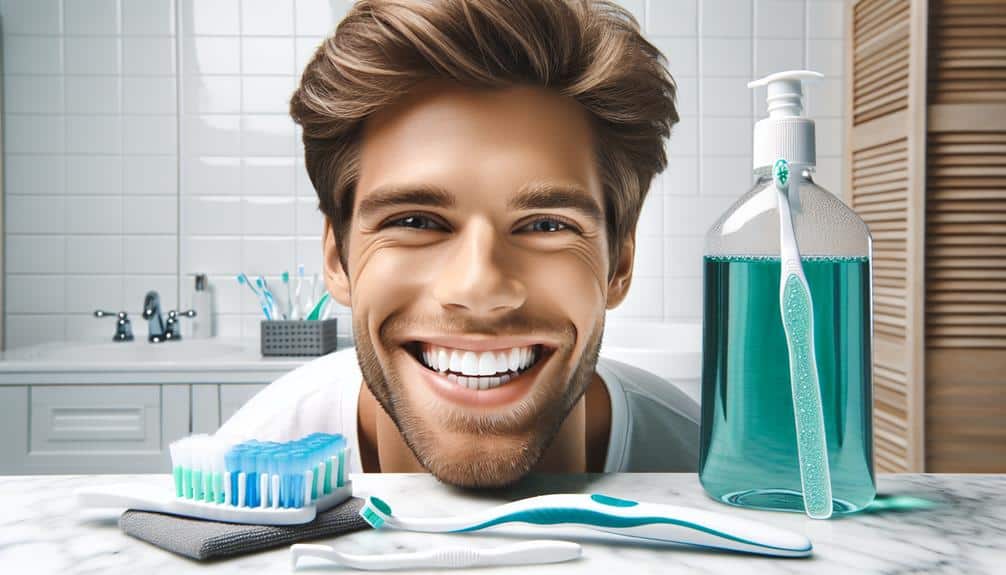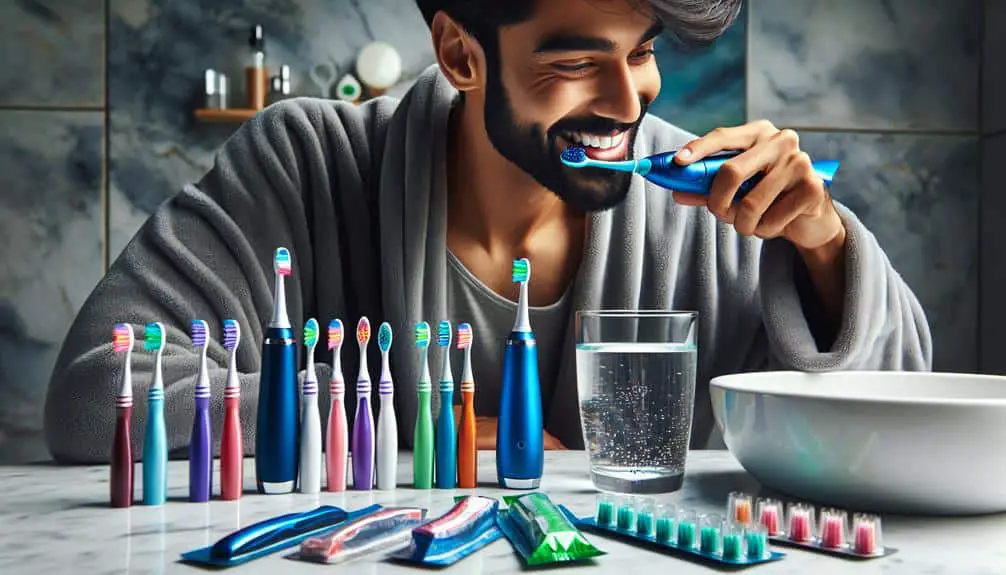To achieve and sustain a brighter smile, start by incorporating daily oral hygiene practices such as proper flossing techniques and using mouthwash to reduce bacteria buildup. Regular dental check-ups are crucial for early detection of oral health issues and professional cleanings. Limit foods and drinks that stain teeth, and consider whitening toothpaste for noticeable results. By maintaining good habits like brushing twice a day and visiting the dentist regularly, you can guarantee a healthy, radiant smile that lasts. Mastering these key methods will set you on the path to a brighter smile that exudes confidence and charm.
Key Points
- Use whitening toothpaste to eliminate surface stains effectively.
- Limit staining foods and drinks like coffee, tea, and wine.
- Regular dental check-ups detect early signs of oral health problems.
- Floss daily to remove plaque and debris for a brighter smile.
- Consider professional whitening treatments for noticeable results.
Daily Oral Hygiene Practices
To maintain a healthy smile, implementing consistent daily oral hygiene practices is essential. Flossing techniques play an important role in removing plaque and debris from areas where your toothbrush may not reach. When flossing, make sure to gently slide the floss up and down the sides of each tooth, forming a 'C' shape to clean below the gum line. This helps prevent cavities and gum disease by reducing bacteria buildup between your teeth.
In addition to flossing, using mouthwash provides added benefits to your oral hygiene routine. Mouthwash can reach areas in your mouth that brushing and flossing may miss, reducing the amount of acid in the mouth, which can lead to tooth decay. It also helps freshen breath and can help prevent gum disease by killing bacteria.
Incorporating proper flossing techniques and utilizing mouthwash benefits daily will contribute significantly to maintaining a bright and healthy smile. Remember, consistency is key in achieving the best oral health.
Regular Dental Check-ups
Regular dental check-ups are essential for maintaining excellent oral health and preventing potential dental issues. These check-ups play a critical role in preventative care by allowing your dentist to detect early signs of cavities, gum disease, and other oral health problems. During these appointments, thorough oral exams are conducted to assess the overall health of your teeth, gums, and mouth.
Routine dental visits help in monitoring your oral health status and addressing any concerns before they escalate into more significant problems. Your dentist will also perform professional cleanings to remove plaque and tartar buildup that can't be effectively eliminated through regular brushing and flossing. Additionally, these check-ups provide an opportunity for you to discuss any oral hygiene concerns or cosmetic procedures you may be considering.
Limit Staining Foods and Drinks
When aiming to maintain a brighter smile, it's important to be mindful of your consumption of staining foods and drinks. Certain items can discolor your teeth over time, diminishing the brightness of your smile. To prevent this, consider the following:
- Avoid coffee, tea, wine, soda: These beverages are known to stain teeth due to their high pigmentation and acidity.
- Limit consumption of berries: Berries, such as blueberries and blackberries, can stain teeth due to their deep color.
- Say no to tobacco: Tobacco products not only harm your overall health but also cause significant staining of teeth over time.
To counteract the effects of staining foods and drinks, you might consider trying whitening strips or exploring natural remedies. Whitening strips can help remove surface stains effectively, while natural remedies like baking soda and hydrogen peroxide can act as gentle abrasives to brighten your smile. By being mindful of your consumption and exploring these options, you can maintain a radiant smile.
Use Whitening Toothpaste
Consider integrating whitening toothpaste into your oral care routine to help maintain a brighter smile. Whitening toothpaste contains abrasive particles or chemicals that work to eliminate surface stains on your teeth. While they may not be as effective as professional treatments like whitening strips, they can still deliver noticeable results over time.
Please be aware that the effectiveness of whitening toothpaste can vary depending on individual factors such as the severity of discoloration and consistency of use.
When compared to home remedies for teeth whitening, whitening toothpaste is generally considered safe for daily use. However, it's crucial to follow the instructions provided on the packaging to prevent any potential damage to your tooth enamel or gums. Additionally, it's recommended to consult with your dentist before starting the use of whitening toothpaste, especially if you have sensitive teeth or existing dental concerns.
Maintain Good Habits
To maintain a bright smile, implementing good habits in your oral care routine is important. Consistency in your dental care and hygiene routines plays a significant role in achieving and sustaining a radiant smile. Here are some key habits to focus on:
- Brushing Techniques: Proper brushing techniques are essential for removing plaque and preventing cavities. Make sure you brush at least twice a day for two minutes each time using a soft-bristled brush and fluoride toothpaste.
- Flossing Habits: Flossing helps remove food particles and plaque from between your teeth and along the gumline, areas your toothbrush may not reach effectively. Make it a routine to floss at least once a day to maintain excellent oral health.
- Dental Care Maintenance: Regular dental check-ups and cleanings are important for preventing issues and maintaining a healthy smile. Visit your dentist at least twice a year for professional cleanings and examinations.
Frequently Asked Questions
Can Genetics Play a Role in the Brightness of My Smile, Despite Following All the Recommended Oral Hygiene Practices?
Despite your diligent oral hygiene practices, genetic factors can influence the brightness of your smile. Professional treatments like whitening can enhance effectiveness, but may cause sensitivity. Consult your dentist for tailored advice.
Are There Any Alternative Methods for Achieving a Brighter Smile for Individuals With Sensitive Teeth or Gums?
If you have sensitive teeth or gums, consider sensitivity solutions before trying gentle whitening methods. Consult with your dentist for tailored advice on achieving a brighter smile without exacerbating sensitivity issues. Prioritize oral health while enhancing aesthetics.
How Long Does It Typically Take to See Noticeable Results When Using Whitening Toothpaste?
For most, whitening toothpaste shows noticeable results within a few weeks of consistent use. Unlike instant whitening solutions, toothpaste takes time to gently lift stains. Patience pays off for a brighter smile.
Are There Any Specific Dental Conditions or Medications That Could Affect the Effectiveness of Whitening Treatments?
If you have specific dental conditions or take medications, they can impact the effectiveness of whitening treatments. Factors like genetics and oral hygiene also play a role in achieving desired results. Consult your dentist for personalized advice.
What Are Some Natural Remedies or DIY Methods That Can Help Whiten Teeth at Home?
If you seek natural remedies for teeth whitening at home, consider herbal remedies like oil pulling or using DIY kits with baking soda. These methods are cost-effective and may help brighten your smile.



